 With the temperature dropping, it's time to find someone to keep you warm. Find your hookups with our online dating guide!
With the temperature dropping, it's time to find someone to keep you warm. Find your hookups with our online dating guide!

Music Home / Entertainment Channel / Bullz-Eye Home
The Barenaked Ladies thought they were being funny when, on their 1992 debut, Gordon, they sang these lines: “Maybe it’s a lack of inspiration that makes me stoop, or maybe it’s a lack of remuneration – I can’t recoup – but if you want it, folks, you got it: it’s all right here in my box set.” While the song, “Box Set,” might keep BNL from releasing a multi-disc career-spanning collection (mostly because they would never, ever hear the end of it), plenty of other artists have dipped into the vaults and put together compilations which mix their best-known material with heretofore-unheard tracks. In some cases, however, artists dispense of previously-released material altogether, cull together all the rarities they can find, and make it an affair strictly for the fans. All told, there are so many such releases in existence that we here at Bullz-Eye didn’t even try to do a formal “Best Ever Box Sets” list. Instead, the writers put together lists of their personal favorites, and we separated out the various-artists collections into their own separate list, just to make it a little less confusing. The musical genres are decidedly across the board, but with the holidays coming up, if you’ve got a friend or family member who’s a full-fledged music geek, we might just have a few ideas for you to consider as gifts.
Albert Ayler, Holy Ghost: Rare & Unissued Recordings (1962-70)
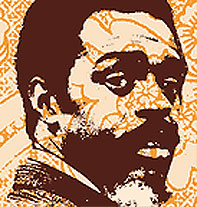 (Revenant) When Revenant Records issued Holy Gost in 2004, the sound of Albert Ayler was finally captured in an all-encompassing, convenient, and attractive package after decades of obscurity. The mythical avant-garde saxophonist had come up during the turbulent 1960s, helping to push the boundaries of jazz into some of its most daring reaches along with contemporaries like Pharoah Sanders, Ornette Coleman, and John Coltrane. Not only does Holy Ghost feature Ayler’s wailing, spiritually exhilarating music in a variety of rare and previously unreleased studio and live sessions (including a performance at Coltrane’s funeral) across seven discs, there are also two discs of interviews as well as some cute memorabilia reproductions. It’s all housed inside a box cast from a hand-carved original, giving the feeling of a small, personal treasure chest filled with history that one might stumble upon in someone’s attic. – Michael Fortes
(Revenant) When Revenant Records issued Holy Gost in 2004, the sound of Albert Ayler was finally captured in an all-encompassing, convenient, and attractive package after decades of obscurity. The mythical avant-garde saxophonist had come up during the turbulent 1960s, helping to push the boundaries of jazz into some of its most daring reaches along with contemporaries like Pharoah Sanders, Ornette Coleman, and John Coltrane. Not only does Holy Ghost feature Ayler’s wailing, spiritually exhilarating music in a variety of rare and previously unreleased studio and live sessions (including a performance at Coltrane’s funeral) across seven discs, there are also two discs of interviews as well as some cute memorabilia reproductions. It’s all housed inside a box cast from a hand-carved original, giving the feeling of a small, personal treasure chest filled with history that one might stumble upon in someone’s attic. – Michael Fortes
The Band, The Last Waltz
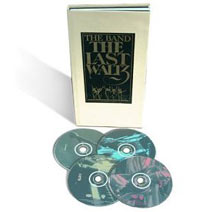 (Warner Brothers)Publicly announcing your intention to retire from touring over the strenuous objections of your bandmates – then arranging for your last concert to be filmed by Martin Scorsese and titling it The Last Waltz – is, it could be argued, an incredibly pretentious thing to do. Then again, nobody ever accused Band-leader Robbie Robertson of suffering from a surplus of humility…and, anyway, the results speak for themselves. Since its release in 1978, The Last Waltz has been consistently hailed as a rock masterpiece. Portions of the performance were left off the original release – in fact, some of them didn’t even make it to the box – and seeing as how we’re talking about a concert that boasted the participation of Dylan, Van Morrison, Clapton, Neil Young, Muddy Waters, Joni Mitchell, Dr. John, and an array of other performers, the beefed-up 2002 version’s additions are as welcome as they are overdue. – Jeff Giles
(Warner Brothers)Publicly announcing your intention to retire from touring over the strenuous objections of your bandmates – then arranging for your last concert to be filmed by Martin Scorsese and titling it The Last Waltz – is, it could be argued, an incredibly pretentious thing to do. Then again, nobody ever accused Band-leader Robbie Robertson of suffering from a surplus of humility…and, anyway, the results speak for themselves. Since its release in 1978, The Last Waltz has been consistently hailed as a rock masterpiece. Portions of the performance were left off the original release – in fact, some of them didn’t even make it to the box – and seeing as how we’re talking about a concert that boasted the participation of Dylan, Van Morrison, Clapton, Neil Young, Muddy Waters, Joni Mitchell, Dr. John, and an array of other performers, the beefed-up 2002 version’s additions are as welcome as they are overdue. – Jeff Giles
Bee Gees, Tales from the Brothers Gibb
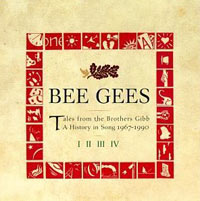 (Polydor)Given how many times it’s been mentioned in various reviews on Bullz-Eye, it’d be nice to think that the majority of our readership is aware that there’s way more to the Bee Gees than just the stuff they recorded in the disco era. If you still haven’t gotten around to confirming that personally, here’s a handy way to more fully explore their musical legacy…well, up through 1990, anyway. (That’s when this was released, if you hadn’t deduced as much.) Though it follows a mostly chronological path through the history of the Bee Gees, Tales still feels somewhat sprawling as it traverses the stylistic differences explored by the Gibbs over the years. There are more concise looks at the group’s career, of course, which focus solely on the obvious hits, but given the inclusion of B-sides, demos, live tracks, and heretofore-unreleased material from the “lost” album, A Kick in the Head Is Worth Eight in the Pants, this is definitely where any burgeoning Bee Gees fan should eventually end up. – Will Harris
(Polydor)Given how many times it’s been mentioned in various reviews on Bullz-Eye, it’d be nice to think that the majority of our readership is aware that there’s way more to the Bee Gees than just the stuff they recorded in the disco era. If you still haven’t gotten around to confirming that personally, here’s a handy way to more fully explore their musical legacy…well, up through 1990, anyway. (That’s when this was released, if you hadn’t deduced as much.) Though it follows a mostly chronological path through the history of the Bee Gees, Tales still feels somewhat sprawling as it traverses the stylistic differences explored by the Gibbs over the years. There are more concise looks at the group’s career, of course, which focus solely on the obvious hits, but given the inclusion of B-sides, demos, live tracks, and heretofore-unreleased material from the “lost” album, A Kick in the Head Is Worth Eight in the Pants, this is definitely where any burgeoning Bee Gees fan should eventually end up. – Will Harris
Booker T and the MGs – Time is Tight
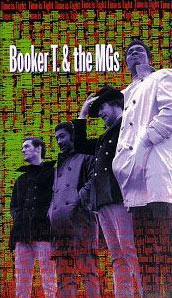 (Stax)God knows Booker T and the MGs have been compiled relentlessly through the decades, and in this day and age of Internet record shops, you can easily track down most of the seminal Stax/Volt house band’s original albums. But if you just want a super-charged blast of southern instrumental soul and funk featuring the absolute best of what this band, whose “less is more” philosophy was never tinkered with, then pick up this box set. Yeah, it has “Green Onions,” “Hip Hug-Her” and the title track. But it also has such cookers as “Soul Sanction,” “Booker’s Notion,” and “I Can Dig It,” each one outdoing the last in toe-tapping funkiness. There are also some killer cover tunes as well, like The Young Rascals’ “Groovin’,” a smoldering, sexy rendition of Gershwin’s “Summertime,” and a live, supreme take on Dylan’s “Lay Lady Lay.” These are three discs packed full with music anyone can enjoy, so follow these rules: listen to it, dance to it, live to it. There’s not a lot of music out there anymore that’s worthy of all three of those things, but this definitely is. – Jason Thompson
(Stax)God knows Booker T and the MGs have been compiled relentlessly through the decades, and in this day and age of Internet record shops, you can easily track down most of the seminal Stax/Volt house band’s original albums. But if you just want a super-charged blast of southern instrumental soul and funk featuring the absolute best of what this band, whose “less is more” philosophy was never tinkered with, then pick up this box set. Yeah, it has “Green Onions,” “Hip Hug-Her” and the title track. But it also has such cookers as “Soul Sanction,” “Booker’s Notion,” and “I Can Dig It,” each one outdoing the last in toe-tapping funkiness. There are also some killer cover tunes as well, like The Young Rascals’ “Groovin’,” a smoldering, sexy rendition of Gershwin’s “Summertime,” and a live, supreme take on Dylan’s “Lay Lady Lay.” These are three discs packed full with music anyone can enjoy, so follow these rules: listen to it, dance to it, live to it. There’s not a lot of music out there anymore that’s worthy of all three of those things, but this definitely is. – Jason Thompson
David Bowie – Sound + Vision
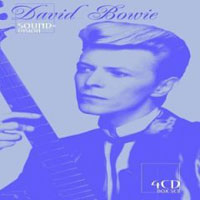 (Rykodisc (original)/Virgin (reissue)) Back when the world had just cracked into the 1990s, Rykodisc set about re-mastering and re-issuing David Bowie’s catalog from Space Oddity through Scary Monsters (and Super Creeps). Bowie got the deluxe treatment through and through, from excellent extra tracks being added to each original album right down to the awesome packaging. In tandem with this, Bowie set out on his “Sound + Vision” tour, and to kick off all the reissues, Rykodisc issued a like-titled box set, a three-disc collection housed in a sexy package with a nice, thick and colorful booklet filled with Bowie’s musical history over the period that the product was covering. There were plenty of hits thrown in, but there were also the important rarities added as well, like “London Bye Ta-Ta,” a very early version of “Space Oddity,” the rare single version of “Rebel, Rebel,” the oddball “1984/Dodo” mash-up from Diamond Dogs that was a completely different recording, the German version of “Heroes” (“Helden”), and more. When the Ryko contract expired and Virgin Records re-reissued Bowie’s catalog, they even went so far as to reissue this box set, which is definitely a rare thing to do when it comes to box sets. However, the reissue went to add an entirely new fourth disc of material, covering most of the rest of Bowie’s career post-RCA. It’s still a dandy set to own, and something that will definitely satisfy those looking for more than just a best-of to survey Bowie’s long and fascinating career. – Jason Thompson
(Rykodisc (original)/Virgin (reissue)) Back when the world had just cracked into the 1990s, Rykodisc set about re-mastering and re-issuing David Bowie’s catalog from Space Oddity through Scary Monsters (and Super Creeps). Bowie got the deluxe treatment through and through, from excellent extra tracks being added to each original album right down to the awesome packaging. In tandem with this, Bowie set out on his “Sound + Vision” tour, and to kick off all the reissues, Rykodisc issued a like-titled box set, a three-disc collection housed in a sexy package with a nice, thick and colorful booklet filled with Bowie’s musical history over the period that the product was covering. There were plenty of hits thrown in, but there were also the important rarities added as well, like “London Bye Ta-Ta,” a very early version of “Space Oddity,” the rare single version of “Rebel, Rebel,” the oddball “1984/Dodo” mash-up from Diamond Dogs that was a completely different recording, the German version of “Heroes” (“Helden”), and more. When the Ryko contract expired and Virgin Records re-reissued Bowie’s catalog, they even went so far as to reissue this box set, which is definitely a rare thing to do when it comes to box sets. However, the reissue went to add an entirely new fourth disc of material, covering most of the rest of Bowie’s career post-RCA. It’s still a dandy set to own, and something that will definitely satisfy those looking for more than just a best-of to survey Bowie’s long and fascinating career. – Jason Thompson
James Brown, Star Time
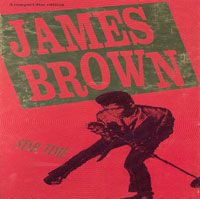 (Polydor) A long time ago in a galaxy far, far away, the Hardest Working Man in Show Business and his teenage pal Bobby Byrd (who just died last September) assembled a phenomenally tight band called the Famous Flames, comprising musicians equally adept at jazz, R&B, pop, soul and whatever else. He had horns, he played the Hammond B-3 organ, and he had some backing singers whose harmonies rivaled anything Motown, Memphis, and Muscle Shoals had to offer. Some pundits say he and the Flames invented soul, but now you can be the judge. After awhile, soul wasn't enough for Brown, with the act and the show morphing into something bigger. With Byrd acting as emcee, introducing Brown and his costumes, yelling, "Get on up," in "Sex Machine," and, in general, keeping a call-and-response rapport going on, the backing group of Fred Wesley, Maceo Parker, Pee Wee Ellis, and a young Bootsy Collins right there on the spot invented funk, rechristening themselves The JB's in the process. This four-CD set documents the whole damned thing, from his 1950s ballads to 1984, which was admittedly well after Brown's peak. For those missing his 1980s output in the post-Polydor phase of his career (mainly "Living in America" and various lesser stuff), there's a companion volume on Scotti Bros. titled "The Hits of the Fourth Decade" that fills in the blanks and even has similar cover art. But this box set gives you James Brown's singles, albums, rarities, remixes, and a great mountaintop view of this American musical titan's career that, with so much of his music going in and out of print would be almost impossible to collect on your own. - Mojo Flucke, PhD
(Polydor) A long time ago in a galaxy far, far away, the Hardest Working Man in Show Business and his teenage pal Bobby Byrd (who just died last September) assembled a phenomenally tight band called the Famous Flames, comprising musicians equally adept at jazz, R&B, pop, soul and whatever else. He had horns, he played the Hammond B-3 organ, and he had some backing singers whose harmonies rivaled anything Motown, Memphis, and Muscle Shoals had to offer. Some pundits say he and the Flames invented soul, but now you can be the judge. After awhile, soul wasn't enough for Brown, with the act and the show morphing into something bigger. With Byrd acting as emcee, introducing Brown and his costumes, yelling, "Get on up," in "Sex Machine," and, in general, keeping a call-and-response rapport going on, the backing group of Fred Wesley, Maceo Parker, Pee Wee Ellis, and a young Bootsy Collins right there on the spot invented funk, rechristening themselves The JB's in the process. This four-CD set documents the whole damned thing, from his 1950s ballads to 1984, which was admittedly well after Brown's peak. For those missing his 1980s output in the post-Polydor phase of his career (mainly "Living in America" and various lesser stuff), there's a companion volume on Scotti Bros. titled "The Hits of the Fourth Decade" that fills in the blanks and even has similar cover art. But this box set gives you James Brown's singles, albums, rarities, remixes, and a great mountaintop view of this American musical titan's career that, with so much of his music going in and out of print would be almost impossible to collect on your own. - Mojo Flucke, PhD
Johnny Cash, Unearthed
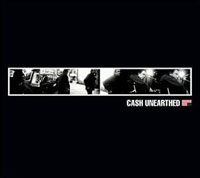 (American) This is a box set which, at first glance, would seem to have come into existence for all of the wrong reasons. Unearthed is a 5-disc collection which offers three discs of rarities, demos, alternate takes, and previously-unreleased recordings from Johnny Cash’s work with producer Rick Rubin, a newly-recorded disc of Cash performing his favorite hymns, and a single-disc compilation which neatly summarizes the Rubin-produced work which had been released up to that point. Unfortunately, given that it emerged only two months after The Man in Black left this veil of tears behind, you can bet that there were plenty of undereducated cynics screaming, “My God, the dirt on the man’s grave hasn’t even settled properly, and here you are, trying to cash in on his legacy!” Needless to say, those people were wrong…and, worse, they probably didn’t realize what an awful pun they’d made in the process of being wrong. Not only was Unearthed already in the process of coming to fruition well before Johnny Cash’s passing, it was a project to which he’d even written the liner notes, offering his consistently entertaining and informative reminiscences of the various songs. Casual fans may not find it a must-own, but anyone who’s spun their copies of Cash’s various American Recordings albums into oblivion certainly will. To those folks, hearing ol’ Johnny rumble his way through versions of “Just the Other Side of Nowhere” (Kris Kristofferson), “Pocahontas” (Neil Young), and “Wichita Lineman” (Glen Campbell), or team up with Nick Cave (“Cindy”), Tom Petty (“The Running Kind”), and Joe Strummer (“Redemption Song”) will be nothing short of sheer bliss. – Will Harris
(American) This is a box set which, at first glance, would seem to have come into existence for all of the wrong reasons. Unearthed is a 5-disc collection which offers three discs of rarities, demos, alternate takes, and previously-unreleased recordings from Johnny Cash’s work with producer Rick Rubin, a newly-recorded disc of Cash performing his favorite hymns, and a single-disc compilation which neatly summarizes the Rubin-produced work which had been released up to that point. Unfortunately, given that it emerged only two months after The Man in Black left this veil of tears behind, you can bet that there were plenty of undereducated cynics screaming, “My God, the dirt on the man’s grave hasn’t even settled properly, and here you are, trying to cash in on his legacy!” Needless to say, those people were wrong…and, worse, they probably didn’t realize what an awful pun they’d made in the process of being wrong. Not only was Unearthed already in the process of coming to fruition well before Johnny Cash’s passing, it was a project to which he’d even written the liner notes, offering his consistently entertaining and informative reminiscences of the various songs. Casual fans may not find it a must-own, but anyone who’s spun their copies of Cash’s various American Recordings albums into oblivion certainly will. To those folks, hearing ol’ Johnny rumble his way through versions of “Just the Other Side of Nowhere” (Kris Kristofferson), “Pocahontas” (Neil Young), and “Wichita Lineman” (Glen Campbell), or team up with Nick Cave (“Cindy”), Tom Petty (“The Running Kind”), and Joe Strummer (“Redemption Song”) will be nothing short of sheer bliss. – Will Harris
Ray Charles, Genius & Soul
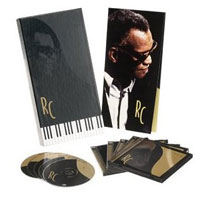 (Atlantic) Five discs and 102 songs might seem like a lot of music, but when you’re talking about Brother Ray, it’s really only the tip of the iceberg. Don’t look to Genius & Soul for a comprehensive overview of Charles’ output, in other words…but really, there isn’t a box on the market that would fit that bill, and in this case, it’s really beside the point. These discs set out to make persuasive arguments for Charles’ possession of both of the qualities laid out in the title, and on that front, they succeed brilliantly. From “Confession Blues” to “I’ll Be Good to You,” this might not be all the Ray you need, but it’ll do (what it do, baby). – Jeff Giles
(Atlantic) Five discs and 102 songs might seem like a lot of music, but when you’re talking about Brother Ray, it’s really only the tip of the iceberg. Don’t look to Genius & Soul for a comprehensive overview of Charles’ output, in other words…but really, there isn’t a box on the market that would fit that bill, and in this case, it’s really beside the point. These discs set out to make persuasive arguments for Charles’ possession of both of the qualities laid out in the title, and on that front, they succeed brilliantly. From “Confession Blues” to “I’ll Be Good to You,” this might not be all the Ray you need, but it’ll do (what it do, baby). – Jeff Giles
Cheap Trick, Sex, America, Cheap Trick
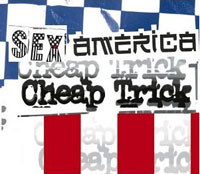 (Epic/Legacy) For a band whose worldwide fan base ultimately defines them, Sex, America, Cheap Trick is a perfect box set. Of course, it’s got all the radio stuff (“I Want You to Want Me”, “Surrender”, “The Flame”), but it also carries the best album tracks (“Southern Girls”, “She’s Tight”, “Cover Girl”), some really cool demos (“World’s Greatest Lover” with Rick Nielsen on vocal), and a slue of previously unreleased gems like “I’m the Man” and “Twisted Heart” (from the God-awful 1983 animated film Rock & Rule), to name just a couple. 32 of the 64 entries here, in fact, have never been found on a prior Cheap Trick release. Certainly, live covers of The Beatles “Daytripper” and Velvet Underground’s “Waitin’ for the Man/Heroin” never hurt to get the fans a little more interested in peeling the cash for a 4-disc set, but maybe even more valuable is the well-written inner booklet, which walks through the band’s entire lifeline as remembered by all four of the regular mates. – Red Rocker
(Epic/Legacy) For a band whose worldwide fan base ultimately defines them, Sex, America, Cheap Trick is a perfect box set. Of course, it’s got all the radio stuff (“I Want You to Want Me”, “Surrender”, “The Flame”), but it also carries the best album tracks (“Southern Girls”, “She’s Tight”, “Cover Girl”), some really cool demos (“World’s Greatest Lover” with Rick Nielsen on vocal), and a slue of previously unreleased gems like “I’m the Man” and “Twisted Heart” (from the God-awful 1983 animated film Rock & Rule), to name just a couple. 32 of the 64 entries here, in fact, have never been found on a prior Cheap Trick release. Certainly, live covers of The Beatles “Daytripper” and Velvet Underground’s “Waitin’ for the Man/Heroin” never hurt to get the fans a little more interested in peeling the cash for a 4-disc set, but maybe even more valuable is the well-written inner booklet, which walks through the band’s entire lifeline as remembered by all four of the regular mates. – Red Rocker
Ornette Coleman, Beauty Is A Rare Thing: The Complete Atlantic Recordings
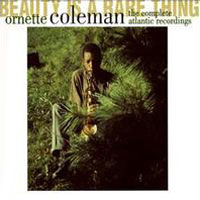 (Rhino) Ornette Coleman was both celebrated and reviled when he burst onto the jazz scene in 1958, with a sound that ruffled the feathers of the established jazz vanguard. In time, Coleman’s dispensing with conventional harmonic accompaniment and chord structure would become accepted, and the recordings he made for Atlantic pretty much sealed the deal. Beauty Is A Rare Thing documents the birth of what Ornette would later call “harmolodics,” a groundbreaking musical system and general philosophy which he still practices to this day. All his best known material is here, from “Lonely Woman” and “Peace” to the historic Free Jazz double quartet sessions with Freddie Hubbard, Eric Dolphy, Scott LaFaro and Ed Blackwell augmenting his classic quartet consisting of Billy Higgins, Charlie Haden and Don Cherry. Six unreleased tunes, some import-only tracks, and rare sessions with Gunther Schuller round out the six-disc set comprising everything Ornette recorded for Atlantic that wasn’t destroyed a warehouse fire which destroyed many of the label’s session tapes in 1976. – Michael Fortes
(Rhino) Ornette Coleman was both celebrated and reviled when he burst onto the jazz scene in 1958, with a sound that ruffled the feathers of the established jazz vanguard. In time, Coleman’s dispensing with conventional harmonic accompaniment and chord structure would become accepted, and the recordings he made for Atlantic pretty much sealed the deal. Beauty Is A Rare Thing documents the birth of what Ornette would later call “harmolodics,” a groundbreaking musical system and general philosophy which he still practices to this day. All his best known material is here, from “Lonely Woman” and “Peace” to the historic Free Jazz double quartet sessions with Freddie Hubbard, Eric Dolphy, Scott LaFaro and Ed Blackwell augmenting his classic quartet consisting of Billy Higgins, Charlie Haden and Don Cherry. Six unreleased tunes, some import-only tracks, and rare sessions with Gunther Schuller round out the six-disc set comprising everything Ornette recorded for Atlantic that wasn’t destroyed a warehouse fire which destroyed many of the label’s session tapes in 1976. – Michael Fortes
Miles Davis Quintet, 1965-68: The Complete Columbia Studio Recordings
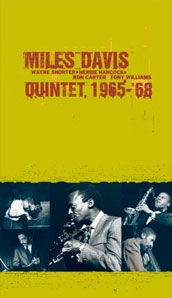 (Columbia/Legacy) All entries in Columbia/Legacy’s acclaimed series of catch-all Miles Davis “metal spine” boxed sets are major benchmarks for historical documentation and beautiful packaging. If there’s one set that can be singled out for consistent listenability and overall quality, however, the 1956-68 quintet box wins the prize. Add to that the striking transformation that is documented, from a tight post-bop unit to an electrified, semi-funky fusion forebear, and the excitement factor jumps up a notch. Herbie Hancock’s debut on electric piano is heard here, which began a lifelong love affair with all manner of electronic keyboard gear. Some of Hancock’s originals, including “I Have A Dream” and “Speak Like A Child,” are heard as rehearsals with Miles for the first time, revealing moments where Miles tried out more complex compositions, only to move on to ever more basic tunes that allowed for greater improvisational flexibility. Wayne Shorter emerges as Miles’ secret weapon with his haunting original compositions and an enigmatic tenor style that created a whole new space in Miles’ band outside of the looming shadow of John Coltrane. And, of course, Tony Williams proves every time that there was no better drummer out there. This is one of those rare six disc sets that one can listen to in a single sitting and feel upset when it ends because there’s no more left to hear. – Michael Fortes
(Columbia/Legacy) All entries in Columbia/Legacy’s acclaimed series of catch-all Miles Davis “metal spine” boxed sets are major benchmarks for historical documentation and beautiful packaging. If there’s one set that can be singled out for consistent listenability and overall quality, however, the 1956-68 quintet box wins the prize. Add to that the striking transformation that is documented, from a tight post-bop unit to an electrified, semi-funky fusion forebear, and the excitement factor jumps up a notch. Herbie Hancock’s debut on electric piano is heard here, which began a lifelong love affair with all manner of electronic keyboard gear. Some of Hancock’s originals, including “I Have A Dream” and “Speak Like A Child,” are heard as rehearsals with Miles for the first time, revealing moments where Miles tried out more complex compositions, only to move on to ever more basic tunes that allowed for greater improvisational flexibility. Wayne Shorter emerges as Miles’ secret weapon with his haunting original compositions and an enigmatic tenor style that created a whole new space in Miles’ band outside of the looming shadow of John Coltrane. And, of course, Tony Williams proves every time that there was no better drummer out there. This is one of those rare six disc sets that one can listen to in a single sitting and feel upset when it ends because there’s no more left to hear. – Michael Fortes
Derek and the Dominos, The Layla Sessions
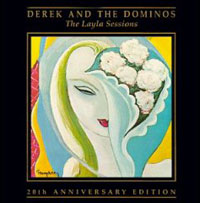 (Polydor)When Eric Clapton left Cream, it wasn't clear just what his next move would be. What did he do? He started this band and did a lot of drugs. This box just covers the one record, but it was a doozy: blues, rock, jams, it's all here. The re-mastered double-album sounds glorious here, and the outtakes, especially the acoustic blues "unplugged" versions, show a facet of this Clapton catalog jewel hitherto unseen. But the centerpiece is a third disc containing just four tracks, all long jams with the Dominos and Allman brothers. Just slap that in the player, sit back, and get a whole new understanding about what Clapton was trying to accomplish while following his blues-rock muse in his drug-addled state. The set’s liner notes are excellent as well, but if you have even the slightest appreciation for electric blues, that third platter alone is worth the cost of admission.- Mojo Flucke, PhD
(Polydor)When Eric Clapton left Cream, it wasn't clear just what his next move would be. What did he do? He started this band and did a lot of drugs. This box just covers the one record, but it was a doozy: blues, rock, jams, it's all here. The re-mastered double-album sounds glorious here, and the outtakes, especially the acoustic blues "unplugged" versions, show a facet of this Clapton catalog jewel hitherto unseen. But the centerpiece is a third disc containing just four tracks, all long jams with the Dominos and Allman brothers. Just slap that in the player, sit back, and get a whole new understanding about what Clapton was trying to accomplish while following his blues-rock muse in his drug-addled state. The set’s liner notes are excellent as well, but if you have even the slightest appreciation for electric blues, that third platter alone is worth the cost of admission.- Mojo Flucke, PhD
Donovan, Troubadour: The Definitive Collection 1964 – 1976
 (Sony) We’ve tried our best to steer away from 2-disc sets since, well, that’s not much of a box set, now, is it? In the case of Donovan’s Troubadour, however, we’re making an exception. It’s partially because, upon its initial release, it came in the standard longbox-sized packaging of any other box set; additionally, though, there’s really not much more to be said about Donovan beyond what’s on these two discs. It’s all great stuff, showing his evolution from a Dylan-esque singer/songwriter into the hippy-dippy Hurdy Gurdy Man who did as much for flower power as anyone else in the music business, but anything more would be overkill…well, except for “I Love My Shirt,” that is. I still can’t believe that’s not on here. (It’s awesome.) – Will Harris
(Sony) We’ve tried our best to steer away from 2-disc sets since, well, that’s not much of a box set, now, is it? In the case of Donovan’s Troubadour, however, we’re making an exception. It’s partially because, upon its initial release, it came in the standard longbox-sized packaging of any other box set; additionally, though, there’s really not much more to be said about Donovan beyond what’s on these two discs. It’s all great stuff, showing his evolution from a Dylan-esque singer/songwriter into the hippy-dippy Hurdy Gurdy Man who did as much for flower power as anyone else in the music business, but anything more would be overkill…well, except for “I Love My Shirt,” that is. I still can’t believe that’s not on here. (It’s awesome.) – Will Harris
Bob Dylan, The Bootleg Series, Vol. 1-3: Rare And Unreleased 1961-1991
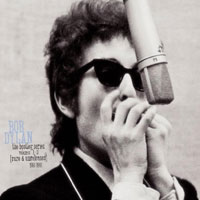 (Columbia / Legacy) Dylan has been anthologized umpteen billion times, but this three disc set – the first in his celebrated Bootleg Series – still stands out as a classy and generous package. Consisting primarily of previously unreleased material, the set spans Dylan’s career from his first Columbia sessions in 1961 to an outtake from 1989’s Oh Mercy. In between, there are the expected unearthed ‘60s high points, such as now-classic tunes “Mama You Been On My Mind” heard in a studio outtake, some Basement Tapes sessions, and alternate versions of old staples “Like A Rolling Stone” and “Tangled Up In Blue.” But the real surprises here are the ‘80s outtakes, primarily the rejected Infidels tracks “Foot Of Pride,” “Lord Protect My Child,” and others that saw Dylan falling into a pattern that Paul McCartney had started a decade earlier, namely losing editorial judgment by leaving his best material on the cutting room floor. – Michael Fortes
(Columbia / Legacy) Dylan has been anthologized umpteen billion times, but this three disc set – the first in his celebrated Bootleg Series – still stands out as a classy and generous package. Consisting primarily of previously unreleased material, the set spans Dylan’s career from his first Columbia sessions in 1961 to an outtake from 1989’s Oh Mercy. In between, there are the expected unearthed ‘60s high points, such as now-classic tunes “Mama You Been On My Mind” heard in a studio outtake, some Basement Tapes sessions, and alternate versions of old staples “Like A Rolling Stone” and “Tangled Up In Blue.” But the real surprises here are the ‘80s outtakes, primarily the rejected Infidels tracks “Foot Of Pride,” “Lord Protect My Child,” and others that saw Dylan falling into a pattern that Paul McCartney had started a decade earlier, namely losing editorial judgment by leaving his best material on the cutting room floor. – Michael Fortes
Echo and the Bunnymen, Crystal Days: 1979 – 1999
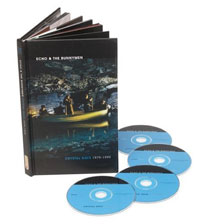 (Sire / Rhino) If you’d asked Ian McCulloch in 1979 if his band, Echo and the Bunnymen, would produce enough quality material to warrant a box set at the beginning of the 21st century, he probably would’ve had the cheek to ask, “Why wait?” American audiences had barely gotten a taste for the Bunnymen before they broke up, having only really embraced their final, self-titled album and its hit single, “Lips Like Sugar,” but the group has long been considered one of the most important and influential bands to emerge from the British post-punk movement of the late ‘70s. Although the band had produced one of the definitive single-disc best-of collections of the era in Songs to Learn and Sing, it took the folks at Rhino to finally give the Bunnymen their proper due; over the course of 4 discs, we’re given a look into the various sides of the band beyond their singles, from pop to rock to psychedelia, veering from the experimental to the mainstream and back again. The set list includes studio and single versions, but Disc 4 is dedicated almost entirely to live tracks, mixing the band’s compositions with some of their favorite covers, with tracks by Bob Dylan, The Doors, The Rolling Stones, and The Velvet Underground among them. It’s mildly eyebrow-raising that the Bunnymen have tried to rewrite history by avoiding the inclusion of even a token track from the band’s lone McCulloch-less outing – 1990’s Reverberation – but, to be fair, only the band’s most diehard fans are likely to complain. – Will Harris
(Sire / Rhino) If you’d asked Ian McCulloch in 1979 if his band, Echo and the Bunnymen, would produce enough quality material to warrant a box set at the beginning of the 21st century, he probably would’ve had the cheek to ask, “Why wait?” American audiences had barely gotten a taste for the Bunnymen before they broke up, having only really embraced their final, self-titled album and its hit single, “Lips Like Sugar,” but the group has long been considered one of the most important and influential bands to emerge from the British post-punk movement of the late ‘70s. Although the band had produced one of the definitive single-disc best-of collections of the era in Songs to Learn and Sing, it took the folks at Rhino to finally give the Bunnymen their proper due; over the course of 4 discs, we’re given a look into the various sides of the band beyond their singles, from pop to rock to psychedelia, veering from the experimental to the mainstream and back again. The set list includes studio and single versions, but Disc 4 is dedicated almost entirely to live tracks, mixing the band’s compositions with some of their favorite covers, with tracks by Bob Dylan, The Doors, The Rolling Stones, and The Velvet Underground among them. It’s mildly eyebrow-raising that the Bunnymen have tried to rewrite history by avoiding the inclusion of even a token track from the band’s lone McCulloch-less outing – 1990’s Reverberation – but, to be fair, only the band’s most diehard fans are likely to complain. – Will Harris
Aretha Franklin, Queen of Soul
 (Atlantic) Her early Columbia recordings only hinted at the depth of her talents, and quite a bit of what she’s done since the mid-‘70s isn’t worth compiling, so this box’s focus on Aretha’s 1967-75 Atlantic sides is as appropriate as it is satisfying. Sure, you miss out on Who’s Zoomin’ Who, but that’s a small price to pay for these 86 lovingly-curated glimpses of the Queen of Soul’s peak-period greatness. Put these four discs in the changer and pretend for 300 glorious minutes that Franklin never moved on to disco or shitty R&B. – Jeff Giles
(Atlantic) Her early Columbia recordings only hinted at the depth of her talents, and quite a bit of what she’s done since the mid-‘70s isn’t worth compiling, so this box’s focus on Aretha’s 1967-75 Atlantic sides is as appropriate as it is satisfying. Sure, you miss out on Who’s Zoomin’ Who, but that’s a small price to pay for these 86 lovingly-curated glimpses of the Queen of Soul’s peak-period greatness. Put these four discs in the changer and pretend for 300 glorious minutes that Franklin never moved on to disco or shitty R&B. – Jeff Giles
Herbie Hancock, The Herbie Hancock Box
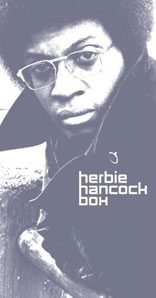 (Columbia/Legacy) As the most successful of Miles Davis’ numerous sidemen, Herbie Hancock has made his own unique mark on the musical landscape with both acoustic and electric jazz, funk and pop. While The Herbie Hancock Box consists solely of material he recorded for Columbia/Sony from ’72 through ’88, it doesn’t suffer all that much for it. Why? Well, for one, many of Herbie’s U.S. fans didn’t have the chance to hear all the acoustic records he was releasing for the Japanese market, and including sides from these albums fills in the blanks on Herbie’s story. Many of his Blue Note classics are revisited here in excellent, lively renditions, including “Maiden Voyage,” “The Eye Of The Hurricane” and “Dolphin Dance.” From trio settings to quartets and quintets with the likes of Freddie Hubbard, Wayne Shorter, Tony Williams and Wynton Marsalis, the set then moves on to cover Herbie’s wildly eclectic electric recordings. It’s all here, from the funky “Chameleon” to the electro hip-hop MTV staple “Rockit” and all points in between (and a bit beyond). If you can find the original clear plexi-glass CD cube box, you’ll have a neat coffee table display piece as well, but even in its current, more ordinary fold-open presentation, the music remains essential. – Michael Fortes
(Columbia/Legacy) As the most successful of Miles Davis’ numerous sidemen, Herbie Hancock has made his own unique mark on the musical landscape with both acoustic and electric jazz, funk and pop. While The Herbie Hancock Box consists solely of material he recorded for Columbia/Sony from ’72 through ’88, it doesn’t suffer all that much for it. Why? Well, for one, many of Herbie’s U.S. fans didn’t have the chance to hear all the acoustic records he was releasing for the Japanese market, and including sides from these albums fills in the blanks on Herbie’s story. Many of his Blue Note classics are revisited here in excellent, lively renditions, including “Maiden Voyage,” “The Eye Of The Hurricane” and “Dolphin Dance.” From trio settings to quartets and quintets with the likes of Freddie Hubbard, Wayne Shorter, Tony Williams and Wynton Marsalis, the set then moves on to cover Herbie’s wildly eclectic electric recordings. It’s all here, from the funky “Chameleon” to the electro hip-hop MTV staple “Rockit” and all points in between (and a bit beyond). If you can find the original clear plexi-glass CD cube box, you’ll have a neat coffee table display piece as well, but even in its current, more ordinary fold-open presentation, the music remains essential. – Michael Fortes
John Lee Hooker, Hooker
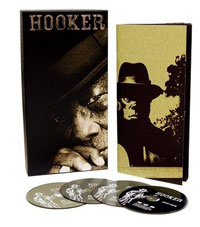 (Shout! Factory) Most of the stuff on these four CDs was previously released on 78, vinyl, 8-track, and crappy non-remastered CDs, but to get a sense of the great Detroit blues innovator's career from early recordings to the very end, this is the place. The book accompanying the music is equally important, offering an historical perspective on the man and his career, and how his moving to Detroit early on figured into his success. Even well-studied Hooker devotees will learn a thing or two by reading the book and following along with the music on their iPods. What a gift to the community of blues fans out there who still love listening to the original artists from the 20th century. The only nit to pick might be the inclusion of too much "duet" material from later in his career, but that can be overlooked, as it gives new fans context to his music by hearing how his artistry directly correlated to the Van Morrisons, Bonnie Raitts, and Los Lobos of the world.- Mojo Flucke, PhD
(Shout! Factory) Most of the stuff on these four CDs was previously released on 78, vinyl, 8-track, and crappy non-remastered CDs, but to get a sense of the great Detroit blues innovator's career from early recordings to the very end, this is the place. The book accompanying the music is equally important, offering an historical perspective on the man and his career, and how his moving to Detroit early on figured into his success. Even well-studied Hooker devotees will learn a thing or two by reading the book and following along with the music on their iPods. What a gift to the community of blues fans out there who still love listening to the original artists from the 20th century. The only nit to pick might be the inclusion of too much "duet" material from later in his career, but that can be overlooked, as it gives new fans context to his music by hearing how his artistry directly correlated to the Van Morrisons, Bonnie Raitts, and Los Lobos of the world.- Mojo Flucke, PhD
Bruce Hornsby, Intersections
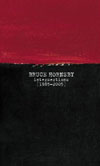 (RCA) Which is more surprising: that Sony/BMG thought Hornsby rated a box at all, or that, when the label greenlighted one, he decided to stuff it with previously unreleased recordings? It makes sense, given Hornsby’s low commercial profile over the last 20 years, but, still, it’s easy to imagine the label’s accountants sweating a little over Intersections’ wealth of live, instrumental, and otherwise esoteric tracks. If you believe a box should act as a retrospective of an artist’s recording career, you’re liable to be frustrated and annoyed with this one, but for Hornsby fans, Intersections will be something like the Holy Grail. – Jeff Giles
(RCA) Which is more surprising: that Sony/BMG thought Hornsby rated a box at all, or that, when the label greenlighted one, he decided to stuff it with previously unreleased recordings? It makes sense, given Hornsby’s low commercial profile over the last 20 years, but, still, it’s easy to imagine the label’s accountants sweating a little over Intersections’ wealth of live, instrumental, and otherwise esoteric tracks. If you believe a box should act as a retrospective of an artist’s recording career, you’re liable to be frustrated and annoyed with this one, but for Hornsby fans, Intersections will be something like the Holy Grail. – Jeff Giles
Elmore James, King of the Slide Guitar
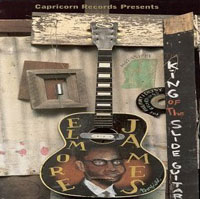 (Capricorn) Again, a rightful re-mastering and loving restoration of hard-to-find recordings, at least in any legitimately playable state. If Robert Johnson was the original slide innovator, it was Elmore who picked up the torch after Johnson perished, ushered the electric slide guitar into the R&B era, and bridged it to Eric Clapton. Keith Richards, Mick Taylor, Clapton…all those guys owe as much, if not more, to James as they do Johnson. His heart gave out before the world could appreciate the cuts he made famous, such as "Dust My Broom," "It Hurts Me Too," and "The Sky is Crying," but they're all here, packaged in gorgeous folk art. The production values alone make this two-disc box – comprising his Trimpet Fire and Chief recordings from his heyday – worth the time.- Mojo Flucke, PhD
(Capricorn) Again, a rightful re-mastering and loving restoration of hard-to-find recordings, at least in any legitimately playable state. If Robert Johnson was the original slide innovator, it was Elmore who picked up the torch after Johnson perished, ushered the electric slide guitar into the R&B era, and bridged it to Eric Clapton. Keith Richards, Mick Taylor, Clapton…all those guys owe as much, if not more, to James as they do Johnson. His heart gave out before the world could appreciate the cuts he made famous, such as "Dust My Broom," "It Hurts Me Too," and "The Sky is Crying," but they're all here, packaged in gorgeous folk art. The production values alone make this two-disc box – comprising his Trimpet Fire and Chief recordings from his heyday – worth the time.- Mojo Flucke, PhD
You can follow us on Twitter and Facebook for content updates. Also, sign up for our email list for weekly updates and check us out on Google+ as well.










